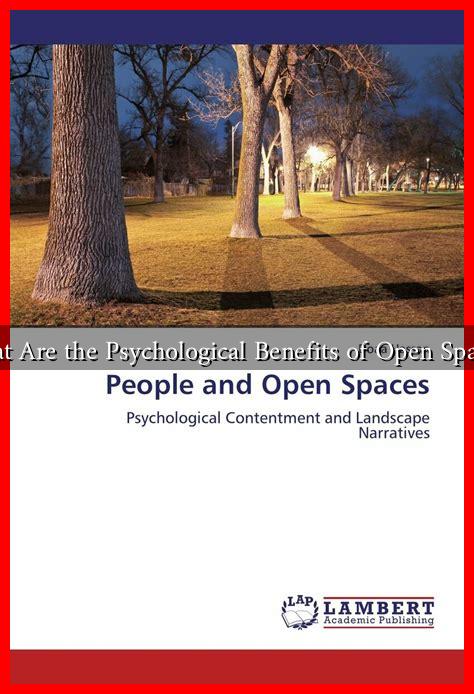-
Table of Contents
What Are the Psychological Benefits of Open Spaces?
Open spaces, such as parks, gardens, and natural reserves, play a crucial role in enhancing the psychological well-being of individuals and communities. As urbanization continues to rise, the importance of these green areas becomes increasingly evident. This article explores the psychological benefits of open spaces, supported by research, case studies, and statistics.
The Connection Between Nature and Mental Health
Numerous studies have shown that spending time in nature can significantly improve mental health. The concept of “biophilia,” proposed by biologist Edward O. Wilson, suggests that humans have an innate affinity for the natural world. This connection can lead to various psychological benefits, including:
- Reduced Stress: Exposure to natural environments has been linked to lower levels of cortisol, the stress hormone. A study published in the journal Environmental Health and Preventive Medicine found that participants who walked in a forest reported significantly lower stress levels compared to those who walked in urban settings.
- Improved Mood: Open spaces can enhance mood and emotional well-being. Research from the University of Essex found that just five minutes of exercise in a natural environment can improve mood and self-esteem.
- Enhanced Cognitive Function: Nature exposure has been shown to improve attention and cognitive function. A study published in Psychological Science found that participants who walked in nature performed better on cognitive tasks than those who walked in urban settings.
Social Benefits of Open Spaces
Open spaces also foster social interactions, which are vital for psychological well-being. Parks and community gardens serve as gathering places where individuals can connect, share experiences, and build relationships. The social benefits include:
- Community Engagement: Open spaces encourage community involvement and participation. For instance, community gardens not only provide fresh produce but also create a sense of belonging among participants.
- Reduced Loneliness: Access to open spaces can help combat feelings of isolation. A study published in the Journal of Environmental Psychology found that individuals living near parks reported lower levels of loneliness.
- Increased Physical Activity: Open spaces promote physical activity, which is closely linked to mental health. The World Health Organization recommends at least 150 minutes of moderate-intensity aerobic activity per week, and parks provide an accessible venue for exercise.
Case Studies Highlighting the Benefits
Several cities around the world have recognized the importance of open spaces and have implemented initiatives to enhance their availability. Here are a few notable examples:
- New York City’s High Line: This elevated park transformed an abandoned railway into a green space, leading to increased community engagement and improved mental health among residents. A study by Nature found that visitors reported feeling happier and more relaxed after spending time on the High Line.
- Singapore’s Park Connector Network: Singapore has developed an extensive network of parks and green corridors, promoting physical activity and social interaction. Research indicates that residents living near these parks experience lower levels of stress and higher overall life satisfaction.
Conclusion: The Vital Role of Open Spaces
Open spaces are not just aesthetic additions to urban environments; they are essential for promoting psychological well-being. The benefits of reduced stress, improved mood, enhanced cognitive function, and increased social interaction highlight the importance of integrating green spaces into our communities. As urbanization continues to expand, prioritizing open spaces can lead to healthier, happier populations. Investing in these areas is not merely a luxury but a necessity for fostering mental health and community cohesion.
In summary, the psychological benefits of open spaces are profound and multifaceted. By recognizing their value and advocating for their preservation and expansion, we can create environments that nurture both individual and collective well-being.



